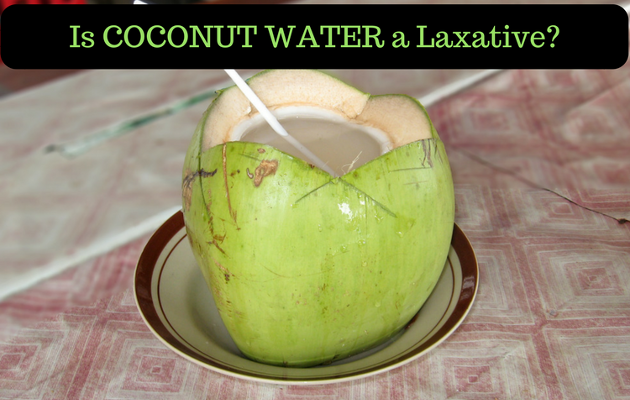
Coconut water comes from young, green coconuts. It has fewer calories and more nutrients than aerated drinks and packaged juices. It is one of the best low-sugar, low-fat drinks to keep you hydrated. Inadequate hydration can lead to constipation and other health issues. There is a lot of misconception about coconut water. Does coconut water cause constipation? Or, is coconut water a laxative?
Keep reading to find out the answers to these questions and also the health benefits of drinking coconut water.
Is Coconut Water a Laxative?
A cup (240 grams) of coconut water contains 46 calories. It is free of fats but has natural sugars, vitamins, and minerals.
Coconut water contains good amounts of calcium, vitamin C, manganese, and potassium. Its minerals and B-complex vitamins such as niacin, thiamin, riboflavin, and folate boost its hydrating effect.
Although coconut water appears like a clear liquid, it contains fiber. So, it has the edge over most packaged fruit juices which may lose fiber during extraction and processing.
Even a homemade fresh fruit juice may lose some fiber in the juice extraction process; however, it still has some amount of soluble fiber. Coconut water provides 11% of the daily recommended intake of fiber.
So, why is fiber content so important? Is coconut water a laxative? Yes, it is a fairly good laxative. But, it should be consumed depending on your bowel tolerance.
It also acts as a natural diuretic as it helps dilute urine as well as increase urine flow. Coconut water is also known as a healthy and digestive tonic. It has bioactive enzymes which help ease constipation.
The enzymes act as a gentle and natural laxative. They help in the absorption of food and improve digestion. They also help the digestive system to flush out waste from the body.
Other Benefits of Coconut Water
In addition to constipation relief, coconut water is also used to treat stomach flu, dysentery, and parasitic infections. It prevents heartburn and acid reflux.
The fiber content in coconut water keeps you full for a longer time. It helps prevent short-term food cravings. According to a study published in the Journal of Medicinal Food, consumption of coconut water resulted in less fat accumulation in cholesterol-fed rats. The study showed that coconut water obtained from both mature and young coconuts had healthy effects on the blood cholesterol levels of rats who were fed a high-cholesterol diet.
Drinking coconut water post-workout replenishes lost electrolytes and is a natural sports drink. It works similar to an intravenous solution.
How Much Coconut Water Should You Drink?
We know that anything in excess is bad. Even if it comes from a natural source, coconut water isn’t safe when consumed in large amounts.
Before you drink coconut water, you should ensure that you have bought the right one. Buying the right coconut water is essential, or you may end up buying an unhealthy alternative.
As much as possible, drink water from fresh coconuts directly. But, if you are unable to find fresh coconuts, you can opt for minimally-processed, cold pressed coconut water. Before buying, check if it contains added sugar.
Coconut water must not have more than 50 calories per serving. Always choose the plain water over the flavored ones. You should only have two servings of coconut water per day.
Coconut water has high amounts of potassium, and drinking large amounts of it may be harmful. It was found that drinking large amounts of coconut water caused unconsciousness, abnormal heart rhythms, and low blood pressure.
Side Effects of Coconut Water
You will experience side effects of coconut water if you drink too much of it every day. Our body requires potassium to maintain electrolyte balance; however, an excess of the mineral can be harmful.
If you have kidney disease, you should practice caution while drinking coconut water or consuming foods high in potassium.
High potassium levels could lead to:
- Uncontrolled diabetes
- Red blood cell destruction
- Muscle tissue breakdown
- Adrenal failure
3 Other Laxative Foods
Here are five other naturally-occurring laxative foods that you can try to relieve constipation.
1. Flaxseeds
Flaxseeds are an excellent source of fiber. A tablespoon of flaxseeds contains three grams of fiber. It adds bulk to stool and helps it pass through the intestine.
You can incorporate them into your diet in many ways. Add ground flaxseeds to soups, cereals, smoothies, or juices. They also have good amounts of protein.
Related: Also Complete List of Fruits for Constipation Relief
2. Leafy green veggies
Leafy veggies are a good source of fiber, and they provide plenty of magnesium, too. Including leafy veggies in your diet improves digestive health. Magnesium acts as a natural laxative and softens stools. It also helps absorb water from the gut.
3. Probiotic foods
Probiotic foods help create a healthy environment in the gut. Probiotics are good bacteria that keep your digestive system healthy. They prevent constipation or diarrhea. Some probiotic foods include coconut kefir, yogurt, buttermilk, apple cider vinegar, tempeh, and miso.
So, is coconut water a laxative? Yes, it is, but you shouldn’t have large quantities of it. Opt for an overall balanced diet that consists of other fibrous foods with a high nutrient content. Drink plenty of water and exercise at least five days a week. Drinking fresh coconut water post-workout is a great way to reap all its health benefits.
Related:
Sources:
“Coconut Water Disadvantages,” University Health News, April 5, 2017; http://universityhealthnews.com/daily/nutrition/drinking-too-much-coconut-water-can-be-dangerous/.
“Coconut Water Guide,” The Dr. Oz Show, February 7, 2014; http://www.doctoroz.com/article/coconut-water-guide.
Nichols, H., “15 Science-Backed Health Benefits of Coconut Water,” Well-Being Secrets;
http://www.well-beingsecrets.com/15-health-benefits-of-coconut-water/#Coconut_Water_has_High_Fiber_Content, last accessed April 19, 2017.













